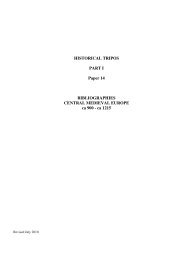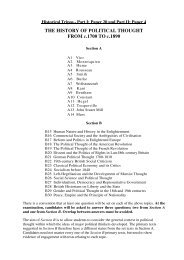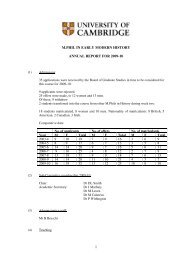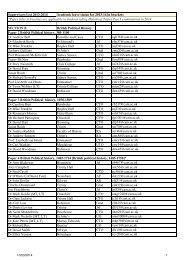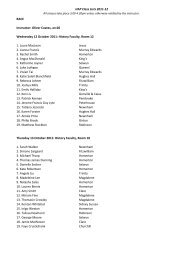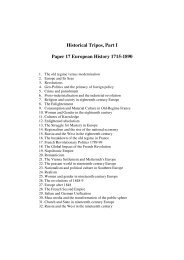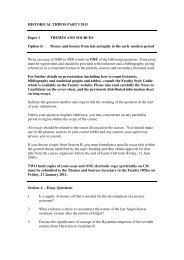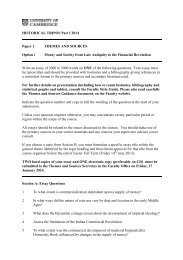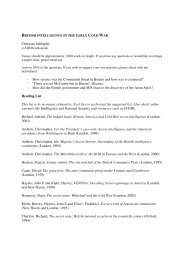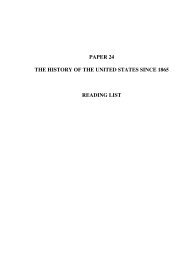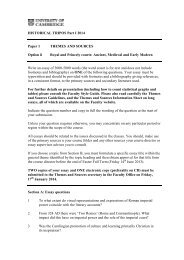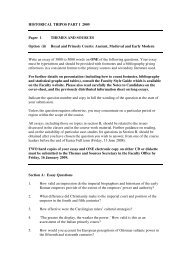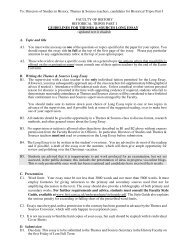Course Handbook - Faculty of History - University of Cambridge
Course Handbook - Faculty of History - University of Cambridge
Course Handbook - Faculty of History - University of Cambridge
You also want an ePaper? Increase the reach of your titles
YUMPU automatically turns print PDFs into web optimized ePapers that Google loves.
Reinhart Koselleck, The Practice <strong>of</strong> Conceptual <strong>History</strong> (Stanford, 2002)<br />
J. G. A. Pocock, ‘The Concept <strong>of</strong> Language and the Metier d’Historien: Some<br />
Considerations on Practice’ in Anthony Pagden, ed., The Language <strong>of</strong> Political Theory in<br />
Early Modern Europe (New York, 1985)<br />
Quentin Skinner, Visions <strong>of</strong> Politics: Volume I: Regarding Method (<strong>Cambridge</strong>, 2002), esp.<br />
chapters. 9 & 10<br />
Anna Wierzbicka, Understanding Cultures Through Their Key Words (Oxford, 1997)<br />
Raymond Williams, Keywords (Harmondsworth, 1976)<br />
Keith Wrightson, ‘Estates, Degrees and Sorts: Changing Perceptions <strong>of</strong> Society in Tudor and<br />
Stuart England’ in Penelope Corfield, ed., Language, <strong>History</strong> and Class (Oxford, Blackwell,<br />
1991)<br />
______, English Society, 1580–1680 (London, 1982)<br />
7) Gender and development<br />
Dr N Mora-Sitja<br />
This course will examine the literature, debate, and approaches linking gender, economic<br />
growth and historical development. Key questions will be how crucial the role <strong>of</strong> women has<br />
been for economic development, and how particular growth trajectories have impacted on<br />
women's status. In order to do so, the course will explore several theoretical and<br />
methodological approaches to the study <strong>of</strong> women and the economy, with particular<br />
emphasis on gender roles at work and within the family, as well as tools to measure and<br />
identify discrimination. The second half <strong>of</strong> the course will be devoted to a comparative study<br />
<strong>of</strong> the impact that key economic developments, such as industrialization or globalization,<br />
have had on gender outcomes, in order to establish more systematic connections between<br />
gender discrimination and the economy.<br />
Some Suggestions for Introductory Reading<br />
Boserup, E. (1970), Woman's Role in Economic Development, New York<br />
Momsen, J.H., Women and Development in the Third World (1991)<br />
Scott, J.W., Gender and the Politics <strong>of</strong> <strong>History</strong> (1988)<br />
Becker, G.S. (1981), A Treatise on the Family<br />
Goldin, C., Understanding the Gender Gap. An Economic <strong>History</strong> <strong>of</strong> American Women<br />
(1990).<br />
Hudson, P. and Lee, W.R. (1990), Women's Work and the Family Economy in Historical<br />
Perspective<br />
Lewis, J. (1984), Women in England, 1870-1950: Sexual Divisions and Social Change<br />
Marcia Guttentag and Paul F. Secord. Too Many Women The Sex Ratio Question.<br />
Beverly Hills, CA: Sage Publications, 1983.<br />
L. Gordon (ed.) Women, the State and Welfare (1990)<br />
D. Sainsbury (ed.) Gender and Welfare State Regimes (1999)<br />
Burnette, J., Gender, Work and wages in Industrial Revolution Britain (2009)<br />
8) The economic policies <strong>of</strong> right-wing dictatorships in the era <strong>of</strong> mass politics<br />
Dr C Ristuccia<br />
This course will analyse economic policy making by European right-wing dictatorships in<br />
the 20 th century, including Fascist Italy, Poland under Marshal Piłsudski, Portugal under<br />
Salazar, Nazi Germany, Franco’s Spain, and Vichy France. <strong>Course</strong> topics will include<br />
nationalism as an economic ideology, theories <strong>of</strong> citizenship in dictatorships, and the impact<br />
<strong>of</strong> economic superiority on the outcome <strong>of</strong> WW2, complemented with in-depth studies <strong>of</strong><br />
economic policy in the countries listed above. The course’s comparative framework, and its<br />
exploration <strong>of</strong> methodological and theoretical tools to study nationalist economic policies,<br />
should provide the students with a solid background to understand Europe’s twentieth<br />
century. Classes will be spread over Michaelmas and Lent.<br />
Introductory reading list<br />
Ben-Ghiat, R. (2001), Fascist Modernities: Italy, 1922–1945, Berkeley and Los Angeles,<br />
CA: <strong>University</strong> <strong>of</strong> California Press.<br />
13




